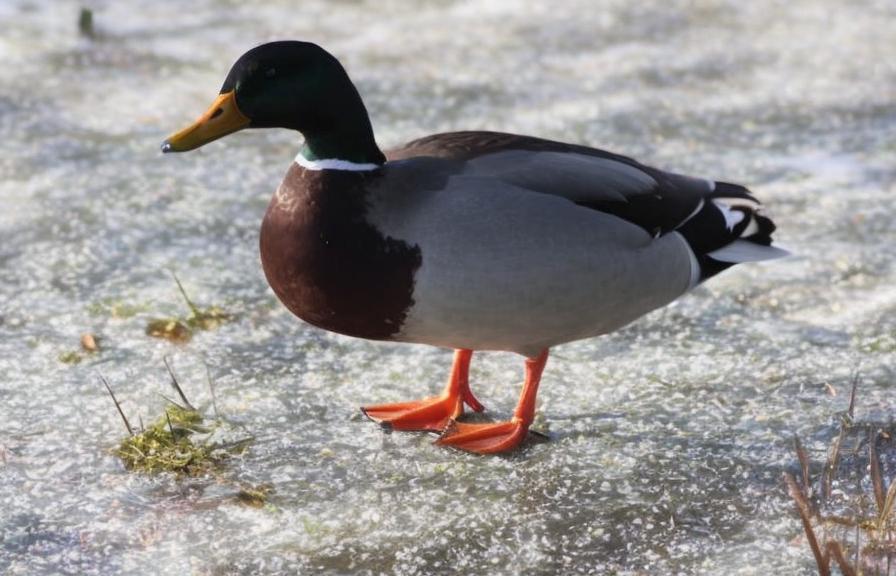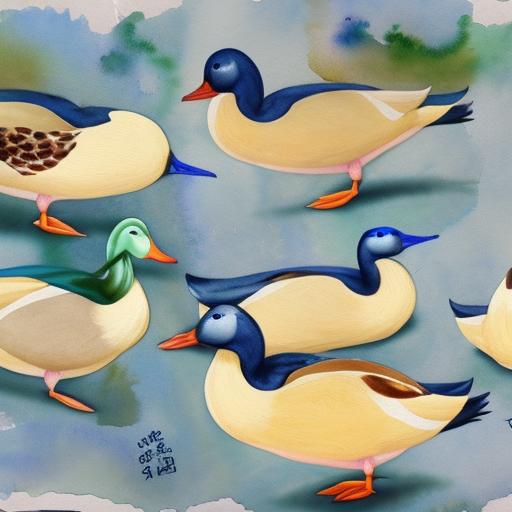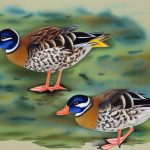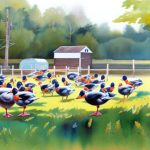Game duck breeds are a group of ducks that have been selectively bred for their ability to thrive in a game or hunting environment. These ducks are known for their agility, endurance, and strong flying abilities, making them popular choices for hunting and game sports. Game duck breeds come in a variety of sizes, colors, and plumage patterns, and they are prized for their beauty as well as their performance. These ducks have a long history of being used for hunting and game sports, and they continue to be popular choices for enthusiasts and breeders alike.
Game duck breeds are often raised in specialized environments that mimic their natural habitats, allowing them to develop their natural instincts and abilities. These ducks are known for their strong flight capabilities, which make them challenging targets for hunters and game enthusiasts. In addition to their physical abilities, game duck breeds are also valued for their intelligence and adaptability, making them well-suited for a variety of game environments. Whether used for hunting, game sports, or as ornamental birds, game duck breeds have a unique set of characteristics that set them apart from other duck breeds.
Key Takeaways
- Game duck breeds are known for their agility, stamina, and ability to thrive in various environments.
- Game duck breeds are characterized by their upright stance, long necks, and strong, muscular bodies.
- Popular game duck breeds include the Indian Runner, Khaki Campbell, and Welsh Harlequin.
- Breeding and rearing game duck breeds require careful selection of breeding stock and proper management of their environment.
- Game duck breeds are used for meat production, egg laying, and as exhibition birds, and they require regular health checks and proper care to thrive.
Characteristics of Game Duck Breeds
Game duck breeds are known for their distinctive physical characteristics that make them well-suited for hunting and game sports. These ducks are typically medium to large in size, with strong, muscular bodies that enable them to fly long distances and endure challenging conditions. Their plumage is often colorful and striking, with patterns that help them blend into their natural environments. Game duck breeds also have strong, webbed feet that allow them to navigate through water and marshy areas with ease.
In addition to their physical characteristics, game duck breeds are also known for their intelligence and adaptability. These ducks are quick learners and can be trained to follow commands and navigate complex game environments. They are also highly social animals, often forming strong bonds with their flock mates and demonstrating cooperative behaviors. Game duck breeds are also known for their high energy levels and need for regular exercise, making them well-suited for active game environments.
Popular Game Duck Breeds
There are several popular game duck breeds that are prized for their performance and beauty. One of the most well-known game duck breeds is the Mallard, which is prized for its strong flying abilities and striking plumage. The Mallard is a versatile breed that is used for both hunting and game sports, and it is known for its adaptability to a variety of environments. Another popular game duck breed is the Pintail, which is valued for its agility and endurance in flight. The Pintail is a fast and agile flyer, making it a challenging target for hunters and game enthusiasts.
The Wood Duck is another popular game duck breed that is known for its stunning plumage and strong flying abilities. This breed is often used in game sports for its beauty as well as its performance, making it a favorite among enthusiasts. The Teal is also a popular game duck breed that is prized for its small size and quick flying abilities. Teal ducks are known for their agility and speed in flight, making them challenging targets for hunters and game sports.
Breeding and Rearing Game Duck Breeds
Breeding and rearing game duck breeds requires careful attention to their natural instincts and behaviors. Game duck breeds are typically raised in specialized environments that mimic their natural habitats, allowing them to develop their natural abilities and instincts. Breeding programs often focus on selecting ducks with strong flying abilities, agility, and endurance, as well as desirable plumage patterns and colors.
Rearing game duck breeds involves providing them with ample space to exercise and develop their flying abilities. Ducks are social animals and thrive in flocks, so it is important to provide them with opportunities to interact with other ducks. Additionally, providing a varied diet that includes protein-rich foods such as insects and aquatic plants can help support the ducks’ physical development and performance.
Uses of Game Duck Breeds
Game duck breeds have a variety of uses, including hunting, game sports, and ornamental purposes. These ducks are prized for their strong flying abilities, agility, and endurance, making them popular choices for hunting enthusiasts. Their ability to navigate through challenging environments such as marshes and wetlands makes them valuable assets for hunters seeking challenging targets.
In addition to hunting, game duck breeds are also used in game sports such as duck racing and agility competitions. These ducks’ high energy levels and quick flying abilities make them well-suited for these types of activities, providing entertainment for both participants and spectators alike.
Game duck breeds are also valued for their beauty and ornamental purposes. Their striking plumage patterns and colorful feathers make them popular choices for ornamental ponds and aviaries, adding a touch of natural beauty to outdoor spaces.
Health and Care of Game Duck Breeds

Proper health and care are essential for maintaining the well-being of game duck breeds. Providing a clean and spacious environment that mimics their natural habitats is crucial for supporting their physical development and mental well-being. Ducks require access to water for bathing and swimming, as well as ample space to exercise their flying abilities.
Regular veterinary check-ups are important for monitoring the ducks’ overall health and addressing any potential issues early on. Providing a balanced diet that includes protein-rich foods such as insects, aquatic plants, and commercial duck feed can help support the ducks’ physical development and performance.
In addition to physical health, it is important to consider the ducks’ mental well-being. Ducks are social animals that thrive in flocks, so providing opportunities for social interaction with other ducks is important for their mental health. Enrichment activities such as providing access to natural water sources, hiding places, and toys can help keep the ducks mentally stimulated and engaged.
Conclusion and Future of Game Duck Breeds
Game duck breeds have a long history of being valued for their performance in hunting and game sports, as well as their beauty as ornamental birds. As interest in hunting and game sports continues to grow, the demand for game duck breeds is likely to remain strong. Additionally, the beauty of these ducks makes them popular choices for ornamental ponds and aviaries.
The future of game duck breeds will likely involve continued efforts to preserve their natural instincts and abilities through selective breeding programs. Maintaining the strong flying abilities, agility, endurance, and striking plumage patterns of these ducks will be important for ensuring their continued success in hunting, game sports, and ornamental purposes.
Overall, game duck breeds have a unique set of characteristics that make them well-suited for a variety of uses, from hunting to ornamental purposes. With proper care and attention to their natural instincts, these ducks will continue to be valued assets for enthusiasts and breeders alike.
If you’re interested in learning more about different game duck breeds, you might also want to check out an article on Poultry Wizard about turning a shed into a chicken coop. This article provides valuable insights into creating a suitable and comfortable living space for your poultry, which is essential for maintaining the health and well-being of game ducks and other fowl. You can find the article here.
FAQs
What are some common game duck breeds?
Some common game duck breeds include the Mallard, Pekin, Rouen, and Muscovy.
What are the characteristics of game duck breeds?
Game duck breeds are known for their strong and agile bodies, as well as their ability to fly and swim well. They are also known for their colorful plumage and distinctive markings.
What are game duck breeds used for?
Game duck breeds are often used for hunting, as they are prized for their ability to fly quickly and evade predators. They are also raised for their meat, which is known for its rich flavor.
How do you care for game duck breeds?
To care for game duck breeds, it is important to provide them with a suitable habitat that includes access to water for swimming and foraging. They should also be fed a balanced diet and provided with protection from predators.
Are game duck breeds good for beginners?
Game duck breeds can be a good choice for beginners, as they are generally hardy and easy to care for. However, it is important to do research and be prepared to provide the necessary care and attention they require.
Meet Walter, the feathered-friend fanatic of Florida! Nestled in the sunshine state, Walter struts through life with his feathered companions, clucking his way to happiness. With a coop that’s fancier than a five-star hotel, he’s the Don Juan of the chicken world. When he’s not teaching his hens to do the cha-cha, you’ll find him in a heated debate with his prized rooster, Sir Clucks-a-Lot. Walter’s poultry passion is no yolk; he’s the sunny-side-up guy you never knew you needed in your flock of friends!







